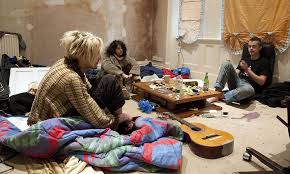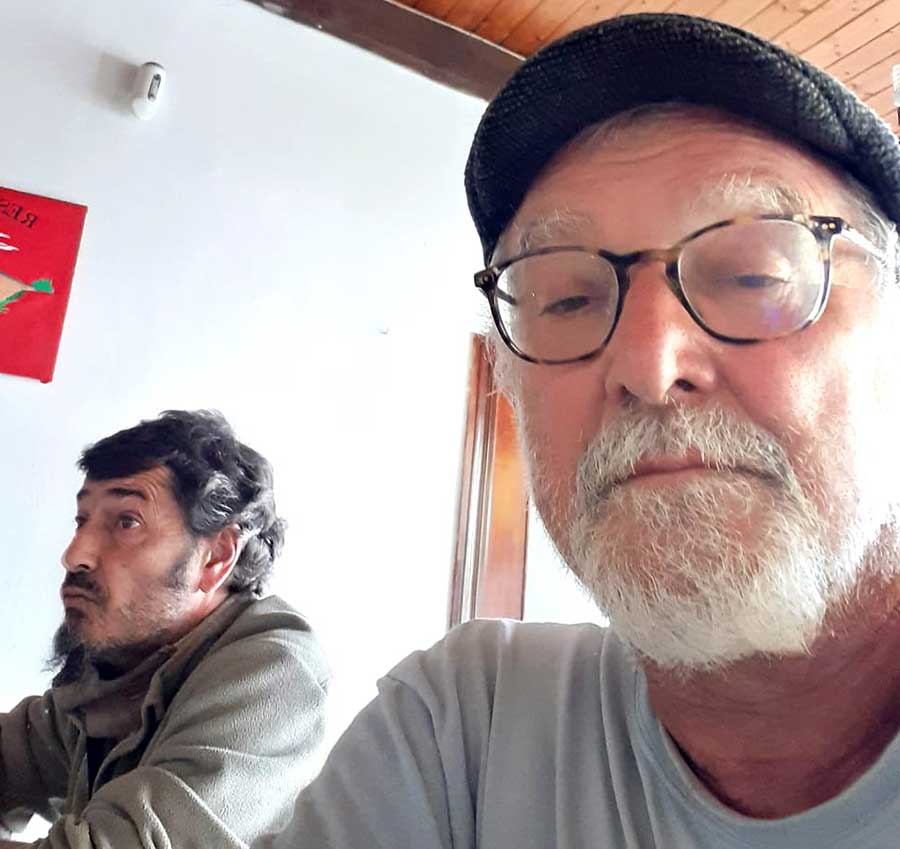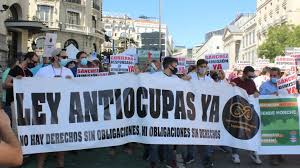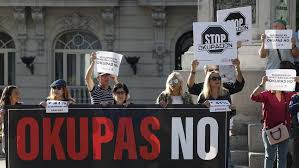By Pablo de Ronda
 Basically squatters (okupas) are bad news for property owners. But I must tell you that I know two, who have become good friends and are absolutely not a threat to my property assets nor anybody else’s.
Basically squatters (okupas) are bad news for property owners. But I must tell you that I know two, who have become good friends and are absolutely not a threat to my property assets nor anybody else’s.
Squatters [Photo: Bella Virtual Staging]
"San Jorge" el gallego
 Jorge, an army veteran, an ex-foreign legionnaire who was based at the Ronda camp, found himself homeless on being discharged, divorced by his wife and with no contact to his children, . First of all he occupied a small house on the grounds of a restaurant for a number of years, with the owner’s blessing.
Jorge, an army veteran, an ex-foreign legionnaire who was based at the Ronda camp, found himself homeless on being discharged, divorced by his wife and with no contact to his children, . First of all he occupied a small house on the grounds of a restaurant for a number of years, with the owner’s blessing.
Last year he had to move and Jorge took over a small house which was owned by a bank after a repossession. He has created a living environment which is enough for him, as a single man, and his several dogs. The bank is aware of this and has no problem. There is little chance of anybody buying the house.
Jorge has no electricity, but he has installed a small solar dish which gives him some power.
San Jorge and Pablo de Ronda [Selfie]
José "el suave"
 José, an accredited albañil (bricklayer) has been forced into life as an okupa following major upheaval in his life – teenage son convicted of murder, and divorced by his wife.
José, an accredited albañil (bricklayer) has been forced into life as an okupa following major upheaval in his life – teenage son convicted of murder, and divorced by his wife.
As with Jorge, the bank is aware that he occupies the property and are happy that he has restored it and looks after it.
Neither Jorge or José is causing a problem to a homeowner.
These two guys have worked for me and helped me with the renovation of a house I invested in as a doer- upper. They also do small projects and odd jobs for us in our other properties.
They are both autónomo (self-employed). When the work for me dried up they worked for building companies on the coast and in Ronda.
José "el suave" [Photo: PW]
And the moral of this story is .....
So, let’s try and make sense of this. If I had a holiday home on the coast which had been taken over by okupas, I would not be happy.
However, Jorge and José haven’t done that. They are occupying properties that nobody wants and which are owned by banks who don’t give a s**t, quite frankly.
Back to the Press story
 Spain’s Congress has just dropped a legislative bombshell that promises to evict "okupas" faster than you can say “o-ku-pa".
Spain’s Congress has just dropped a legislative bombshell that promises to evict "okupas" faster than you can say “o-ku-pa".
In a move that’s sparking heated debate across the country, the newly approved "anti-okupas" law aims to slash eviction times from months to mere hours.
[Photo courtesy of 20 Minutos]
This sweeping reform, which has already passed through Congress, now heads to the Senate for its final seal of approval. Once it appears in the Boletín Oficial del Estado (BOE), it’s game over for squatters.
What’s changing?
The reform targets articles 245 and 202 of the Penal Code, making squatting a fast-track offence. Usurpation and unlawful entry will now be dealt with in expedited trials – think eviction in 15 days or less. No more standard trials dragging on for months; it’s all about swift justice.
 To put this in perspective, Spain currently has over 15,000 illegally occupied properties, according to the Ministry of the Interior.
To put this in perspective, Spain currently has over 15,000 illegally occupied properties, according to the Ministry of the Interior.
The new law is set to bring lengthy and costly eviction processes to an end and hopefully bring some stability to the house rental market, as owners will feel more protected.
[Photo courtesy of La Razon]
Pizza plots and eviction loopholes
Squatters have become increasingly creative in dodging eviction. One cheeky tactic involves ordering pizza to the property they intend to occupy. By showing a receipt dated more than 48 hours earlier, they’ve been able to claim residency – a loophole that’s left property owners fuming.
But with the new law, such antics won’t stand a chance. Squatters will face the boot quicker than they can finish their slice of pizza margarita.
What about families with children?
Here’s the sticking point. If children are involved, social services step in to assess the situation, potentially dragging out the process. Protecting minors remains a priority, even under the new expedited system.
A legal game-changer
 When fully implemented, the "anti-okupas" law promises to be a landmark moment for property rights in Spain. While it’s being hailed as a lifeline for homeowners, critics argue it could trample on social protections for the most vulnerable.
When fully implemented, the "anti-okupas" law promises to be a landmark moment for property rights in Spain. While it’s being hailed as a lifeline for homeowners, critics argue it could trample on social protections for the most vulnerable.
With evictions about to get turbo-charged, one thing’s clear – the days of squatters living rent-free are numbered.
But where will all these people go? Sure, some will be forced to do “the unthinkable” and pay rent, but the truly vulnerable may be left exposed.
[Photo courtesy of El Corte Inglés]
© Pablo de Ronda
Acknowledgements:
Euro Weekly News
Marc Menendez-Roche
Pablo de Ronda
Photos:
20 Minutos
Bella Virtual Staging
El Corte Inglés
La Razon
Paul Whitelock
Shutterstock
Tags:
albañil, anti-okupas law, army veteran, BOE, Boletín Oficial del Estado, bricklayer, Congress, divorced, El Gallego, el suave, Euro Weekly News, ex-foreign legionnaire, house rental market, Jorge, José, living rent-free, Marc Menendez-Roche, Ministry of the Interior, murder, okupa, Pablo de Ronda, Paul Whitelock, Senate, Shutterstock, solar dish, squatter, Squatters in Spain,